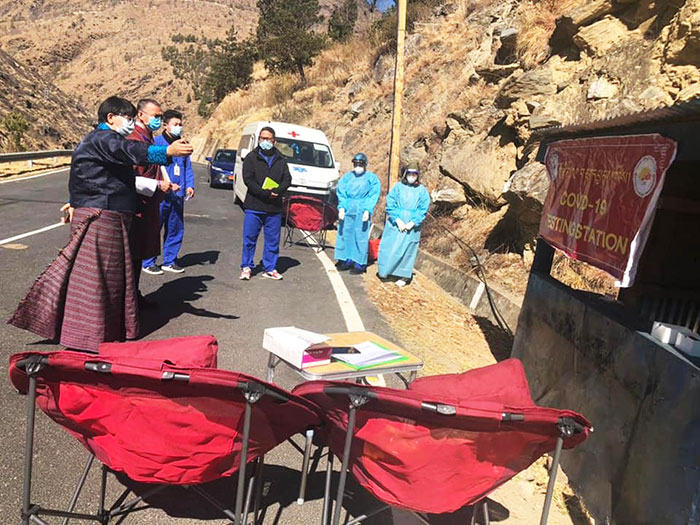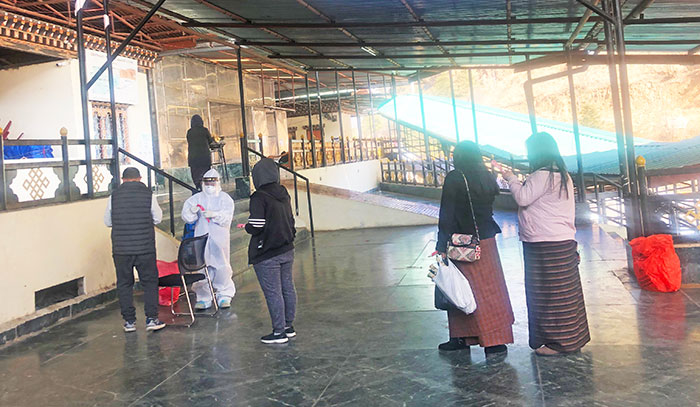
Health ministry has set up Covid-19 testing stations at Chhudzom and Menchhuna check posts to strengthen Covid-19 surveillance. Testing has been also conducted at Thimphu bus terminal once a week for buses and passengers leaving Thimphu.
Younten Tshedup
The capital’s busiest thoroughfare, Norzin Lam, is bustling as usual. After the recent scare from the local outbreak of Covid-19, life in the country has returned to ‘normal’ today.
However, to maintain this momentum and to avoid another possible episode of a lockdown, the government has planned aggressive testing — active and passive — until the situation gets better.
This, according to Prime Minister Dr Lotay Tshering, would require the country to conduct around 20,000 tests in a day after the unlocking.
Sowai Lyonpo (health minister) Dechen Wangmo, said that with the objective to pick up positive cases from the community, should there be any, within a period of one week, the post-outbreak surveillance system was enhanced.

Random testing at the CFM in Thimphu yesterday
Lyonpo said that the stepped up surveillance system was categorised into two — active and passive surveillances. Under active surveillance, people working at all the point of entries in the bordering towns and Paro international airport would have to undergo mandatory testing after every 14 days.
Students and teachers in schools, across the country, would also be tested every fortnightly. “This is our top-most priority because even after the vaccine is rolled out, students will remain unprotected,” she said.
Lyonpo added that 20 percent of the workers in factories and industries, including places where there are unavoidable large gatherings such as the centenary farmer’s market (CFM), grocery stores, barbershops, and saloons will also be tested once every two weeks.
“We would be testing 50 percent of the vendors at the CFM and about 300 shoppers randomly,” she said, adding that mega projects, monastic institutions, and mobile populations such as public transport drivers would also require testing to ensure that these frontliners are clean at any given point of time. “We want to pick up any positive as soon as possible so that an outbreak, should there be one, doesn’t spread to the mass.”
Beginning February 1, people travelling outside Thimphu and Paro are randomly tested at the Covid-19 testing centres established at Menchunan and Chudzom checkpoints.
The passive surveillance, Lyonpo explained, would be when a person with symptoms comes forward for testing. For this, she said that the 58 flu clinics across the country would be actively functioning. “We again would like to request anyone with flu-like symptoms to visit the flu clinics.”
Health workers in the hospitals would also be tested every fortnightly, including inpatients and their attendants. OPD cases would also have to undergo the mandatory testing. “By having this level of surveillance across all the 20 districts, we hope to pick up cases at the earliest and give a certain level of confidence to the public.”
The threat is not over
Lyonpo said that Bhutan was the only country in the world where the entire capital city’s population was swept on two different occasions.
Four days after the detecting the index case on December 20, over 9,000 people were tested to see the extent of the outbreak. After testing over 60,000 people from across the country over a period of about 40 days, the minister said that the health ministry was confident enough to lift the lockdown restrictions.
However, Lyonpo said that this did not mean that there were no cases in the country. “We cannot guarantee that there are no residual cases in the community.” She explained that because the incubation period for the disease was some 14 days, it would be very difficult to establish that there were no residual cases.
“We are therefore, emphasising on the preventive measures that the public must follow at all times. These measures work and we have realised that the biggest benefit we had this outbreak was from our people following these precautionary measures. It contributed in limiting the spread of the disease and we must continue this.”
Lyonpo added that individuals, besides following preventive measures, should also encourage and insist others to do the same. “I think there should be a citizen movement. If you go to a saloon and the operators there don’t use face mask, you have to insist and make them wear it. The more you insist, the more mindful they become.”

